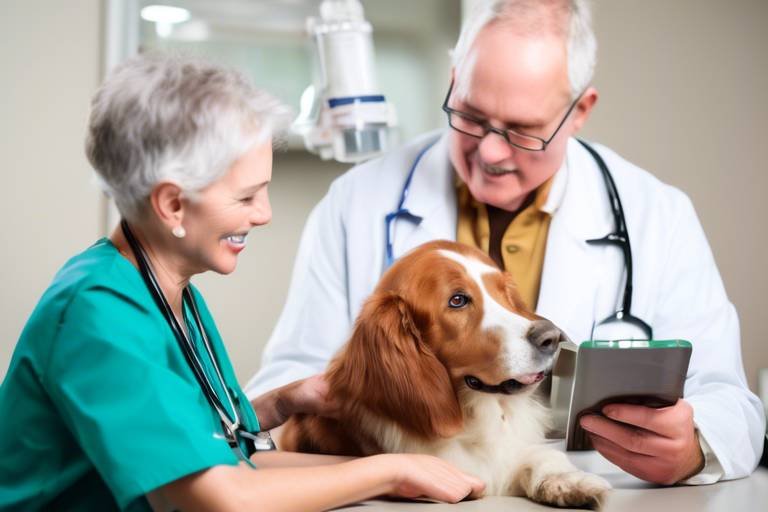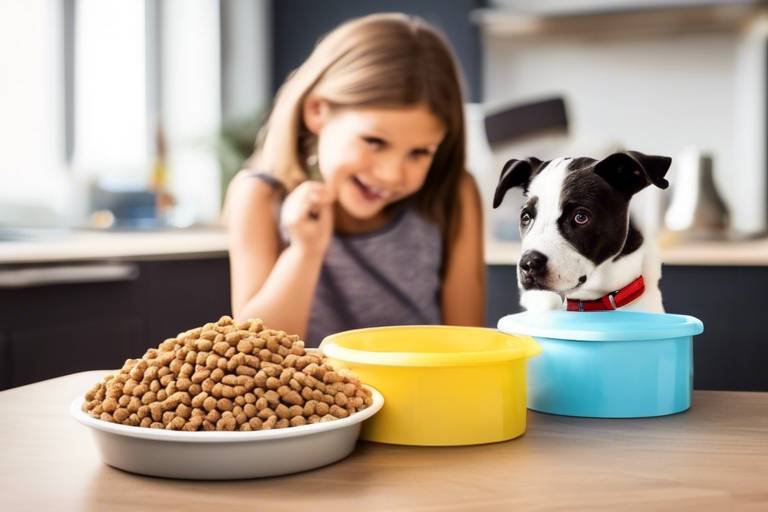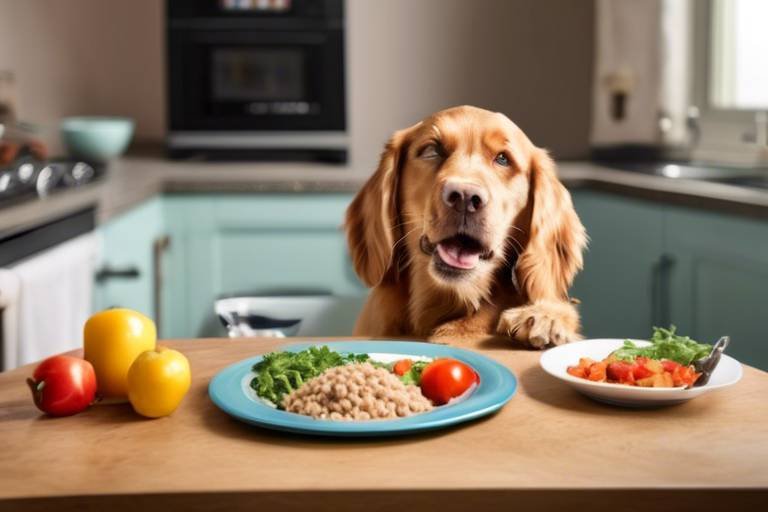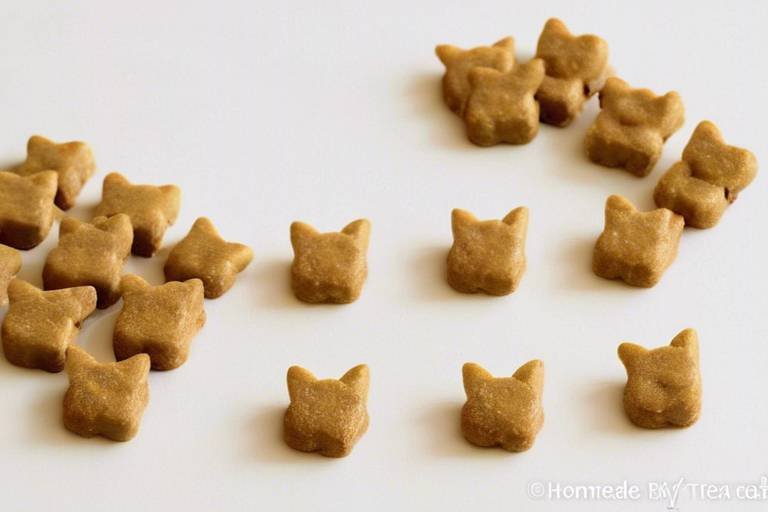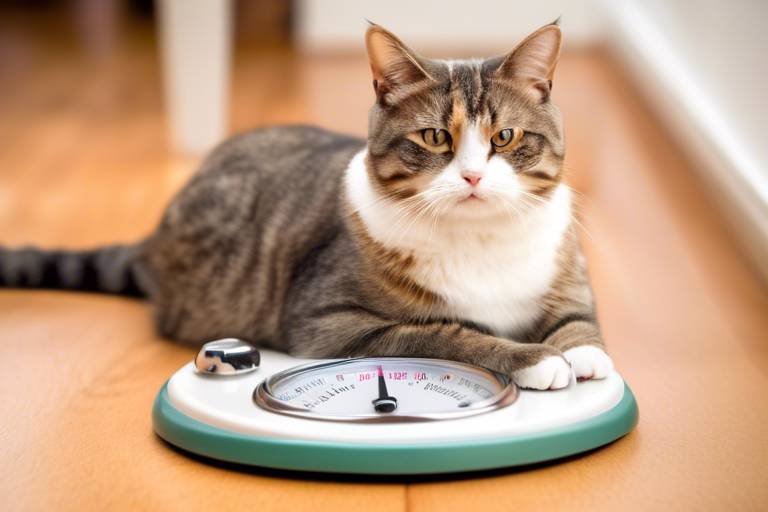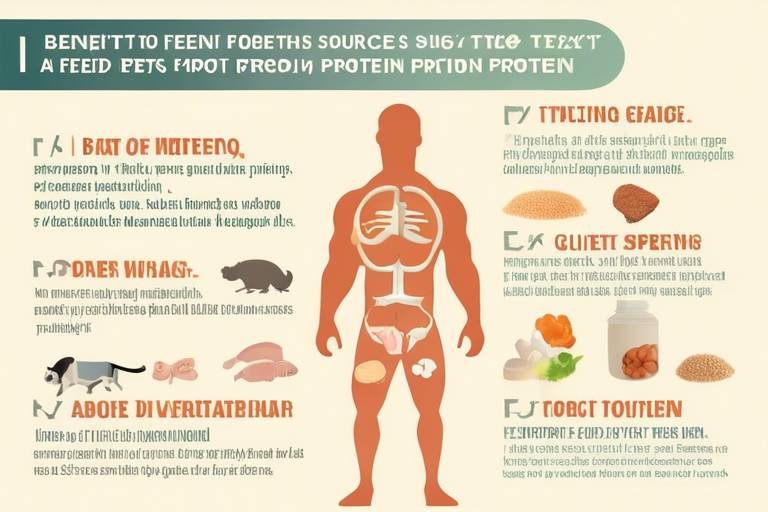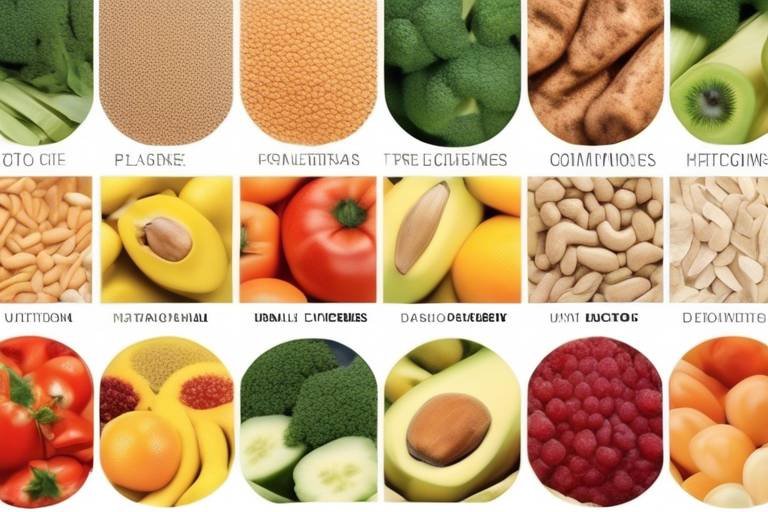The Importance of Regular Vet Visits for Nutritional Guidance
As a pet owner, you want the best for your furry friends, right? One of the most effective ways to ensure their health and happiness is through regular veterinary visits. These check-ups are not just about vaccinations or health screenings; they are crucial for understanding and optimizing your pet's nutrition. Just like humans, pets require a balanced diet tailored to their unique needs, and who better to guide you through this than your veterinarian? In this article, we’ll explore why these visits are essential for maintaining your pet's overall well-being and how they can help you make informed dietary choices.
Before diving into the specifics of veterinary guidance, it's vital to grasp the basics of pet nutrition. Pets, whether they are cats, dogs, or other critters, have specific dietary needs that must be met for them to thrive. A balanced diet typically includes a mix of proteins, fats, carbohydrates, vitamins, and minerals. Think of it as a recipe for a happy, healthy pet! Just like how we feel energized and vibrant when we eat well, our pets also benefit immensely from a nutritious diet. But what does a balanced diet look like for your pet? Let’s take a closer look.
Your veterinarian is like a personal trainer for your pet's nutrition. They have the expertise to guide you in making the best dietary choices. During regular check-ups, vets can assess your pet's health and nutritional needs. This is especially important because pets are not one-size-fits-all; their dietary requirements can vary significantly based on factors such as age, breed, and activity level. For instance, a young, energetic puppy will have different nutritional needs compared to a senior dog. By working closely with your vet, you can ensure that your pet is getting the right nutrients to support their specific lifestyle.
During routine check-ups, veterinarians assess your pet's unique nutritional requirements. This involves looking at various factors such as age, breed, weight, and overall health status. For example, a vet might use a simple chart to determine if your pet is at a healthy weight or if they need to shed a few pounds. This assessment is crucial because it allows for personalized dietary recommendations that cater specifically to your pet's needs.
One of the most exciting aspects of regular vet visits is the possibility of creating customized diet plans. Your vet can develop a tailored nutrition strategy that ensures your pet receives all the necessary nutrients. This could involve recommending specific commercial pet foods, home-cooked meals, or dietary supplements. Imagine having a meal plan designed just for your pet—how cool is that? This individualized approach can lead to better health outcomes and a happier pet.
Regular veterinary visits also play a significant role in monitoring your pet's weight and overall health. Obesity is a common issue in pets, and it can lead to serious health problems like diabetes and joint issues. By keeping track of your pet's weight during vet visits, you can catch any concerning trends early. Your vet can provide guidance on how to manage your pet's weight through diet and exercise, ensuring they remain fit and active.
Preventive care is closely linked to nutrition. Regular vet visits can help identify potential dietary-related diseases before they become serious issues. For example, certain nutritional deficiencies can lead to skin problems, poor coat health, or digestive issues. By addressing these concerns early, you can promote long-term health for your pet. Think of it as a proactive approach—just like getting regular check-ups for yourself, it’s all about catching problems before they escalate!
Even with the best intentions, it’s easy for pet owners to overlook common nutritional issues. Some prevalent problems include obesity, allergies, and nutritional deficiencies. These conditions can significantly impact your pet's health and quality of life. For instance, obesity can lead to a host of health problems, while allergies might cause discomfort and skin irritations. Understanding these issues is crucial for any pet owner.
So, how can you tell if your pet is facing nutritional problems? Being observant is key! Look for symptoms such as:
- Excessive weight gain or loss
- Changes in coat quality (dull or flaky)
- Frequent vomiting or diarrhea
- Excessive scratching or skin irritations
If you notice any of these signs, it’s time to consult your vet for a dietary evaluation.
Your vet can provide specific dietary recommendations tailored to your pet's unique needs. This might include switching to a different type of food, introducing supplements, or even adjusting meal portions. Remember, what works for one pet may not work for another, so always consult your vet before making changes. They can help you navigate the vast world of pet nutrition, ensuring your furry friend receives the best possible care.
Establishing a strong relationship with your veterinarian is vital for effective nutritional guidance. Open communication and trust are essential in achieving the best health outcomes for your pet. Don’t hesitate to ask questions during your visits—your vet is there to help! By fostering this relationship, you can ensure that your pet receives the best possible care throughout their life.
Q: How often should I take my pet to the vet for nutritional advice?
A: It's recommended to schedule vet visits at least once a year, but more frequent visits may be necessary for older pets or those with specific health concerns.
Q: Can I change my pet’s diet without consulting a vet?
A: It's always best to consult your veterinarian before making any significant changes to your pet's diet to ensure it meets their nutritional needs.
Q: What are some signs that my pet's diet may need to be adjusted?
A: Look for changes in weight, coat condition, energy levels, and overall health. If you notice anything unusual, consult your vet.

Understanding Pet Nutrition
When it comes to our furry friends, understanding pet nutrition is not just important—it's essential. Just like us, pets require a balanced diet to thrive. But what does that really mean? Well, think of it this way: if you were to fuel a high-performance car with low-grade gasoline, it wouldn't run efficiently. Similarly, a pet's body needs the right mix of nutrients to function optimally. This is where the concept of a balanced diet comes into play, and it consists of proteins, fats, carbohydrates, vitamins, and minerals.
First off, let’s break down these components. Proteins are crucial for growth and repair, especially in young pets or those recovering from illness. They are the building blocks of your pet's body, helping to maintain strong muscles and a healthy immune system. Then we have fats, which are not just a source of energy but also play a vital role in absorbing certain vitamins. They keep your pet's skin and coat shiny and healthy. Carbohydrates provide the energy needed for daily activities, while vitamins and minerals support various bodily functions, from bone health to metabolic processes.
Now, you might be wondering how to ensure your pet gets all these nutrients. The answer lies in understanding their specific needs based on factors like age, breed, activity level, and health condition. For instance, a high-energy puppy requires more protein compared to a senior dog who may need a diet lower in calories but higher in fiber to aid digestion. It’s a bit like tailoring a wardrobe—what fits one pet perfectly might not suit another at all!
Moreover, the importance of hydration cannot be overlooked. Fresh water should always be available, as it plays a critical role in digestion and overall health. Dehydration can lead to serious health issues, just like it can for humans. So, keeping your pet hydrated is as crucial as providing them with the right food.
To make things even clearer, let’s consider a simple table that summarizes the key components of a balanced pet diet:
| Nutrient | Function | Sources |
|---|---|---|
| Proteins | Growth, repair, and immune function | Meat, fish, eggs, legumes |
| Fats | Energy and absorption of vitamins | Fish oil, chicken fat, flaxseed |
| Carbohydrates | Energy source | Grains, vegetables, fruits |
| Vitamins | Support bodily functions | Fruits, vegetables, supplements |
| Minerals | Bone health and metabolic processes | Meat, dairy, vegetables |
In conclusion, understanding pet nutrition is a journey that every pet owner should embark on. It's not just about feeding your pet; it's about feeding them right! Regular veterinary visits can help ensure that your pet is on the right track, receiving the appropriate diet tailored to their unique needs. After all, a well-nourished pet is a happy and healthy pet!
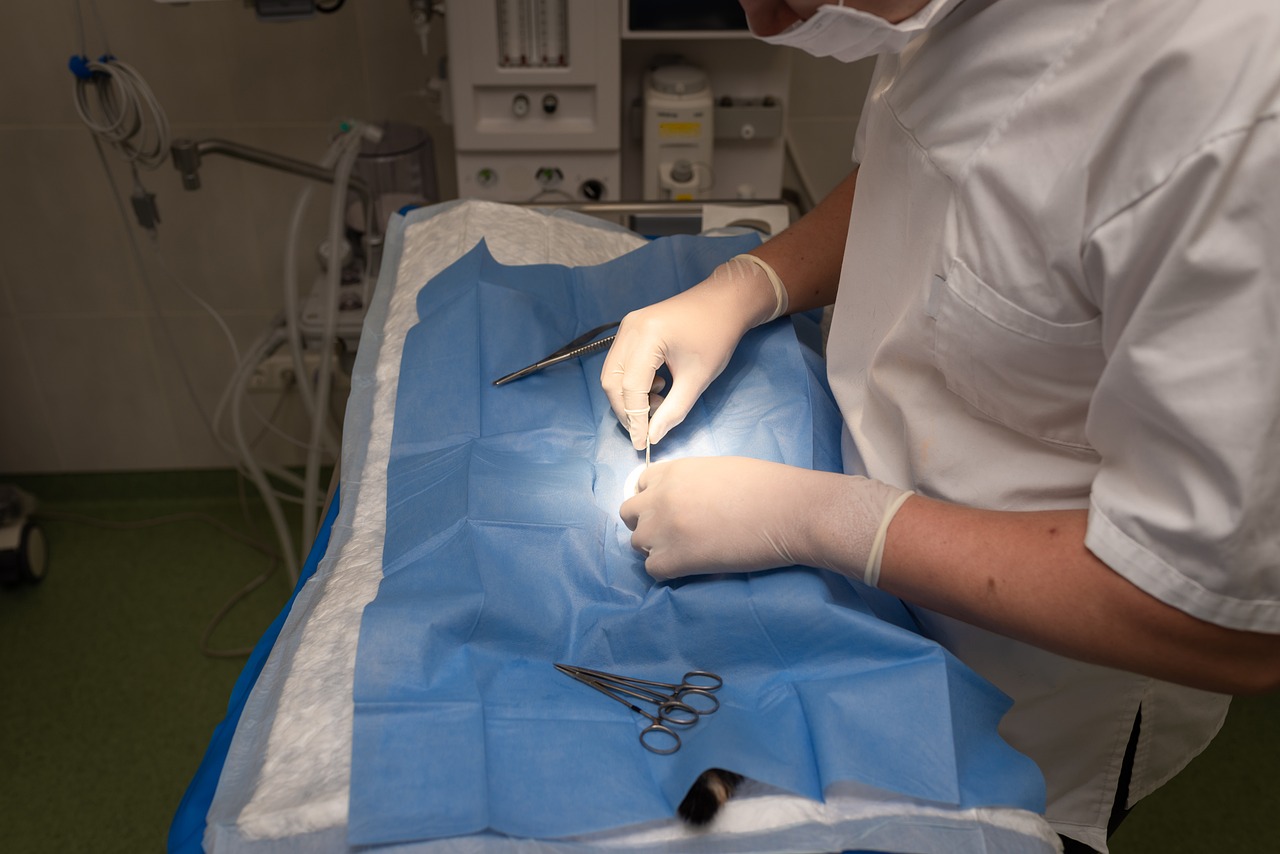
The Role of Veterinarians
Veterinarians are not just doctors for our furry friends; they are the guardians of pet health. Their expertise extends beyond treating illnesses; they play a pivotal role in guiding pet nutrition. Just like a skilled chef knows how to whip up a delicious and balanced meal, veterinarians understand the unique dietary needs of different pets. With their scientific knowledge and practical experience, they help pet owners navigate the often confusing world of pet food and nutrition.
When you take your pet to the vet for a check-up, you’re not just getting a routine physical; you’re also getting a wealth of information about how to keep your pet healthy through proper nutrition. Vets can help you understand the nutritional requirements specific to your pet's age, breed, and lifestyle. For instance, a growing puppy has different needs compared to a senior dog or a cat with a specific health condition. This tailored approach ensures that your pet is not just surviving but thriving.
One of the most critical aspects of a veterinarian’s role is assessing your pet’s nutritional needs. During a routine visit, your vet will evaluate several factors, including:
- Age: Puppies and kittens require more calories and nutrients to support their growth.
- Breed: Some breeds are prone to specific health issues that can be managed with diet.
- Health Status: Pets with conditions like diabetes or allergies need specialized diets.
After assessing these factors, veterinarians can create customized diet plans that cater to your pet's specific needs. This is not a one-size-fits-all solution; it’s a personalized approach that takes into account your pet's unique health profile. Imagine trying to fit a square peg into a round hole; that’s what feeding your pet the wrong diet can feel like. A tailored diet plan ensures your pet gets the right nutrients in the right amounts, which is essential for maintaining their health and vitality.
Moreover, regular vet visits allow for ongoing monitoring of your pet's weight and overall health. Weight management is crucial in preventing obesity, which can lead to a host of health problems such as diabetes, joint issues, and heart disease. By keeping track of your pet's weight during check-ups, veterinarians can make necessary dietary adjustments to keep your furry companion in tip-top shape. Think of it as a wellness check; just like we need to keep an eye on our own health, our pets deserve the same attention.
In conclusion, veterinarians are invaluable allies in ensuring that our pets receive the best possible nutrition. Their expertise helps pet owners make informed dietary choices, create customized meal plans, and monitor health effectively. By building a strong relationship with your vet and making regular visits, you’re not just investing in your pet’s health; you’re ensuring a longer, happier life for your furry friend.
Q: How often should I take my pet to the vet for nutritional guidance?
A: It's recommended to visit the vet at least once a year for a general check-up, but pets with specific health issues may require more frequent visits.
Q: Can I feed my pet homemade food?
A: While homemade diets can be beneficial, it's crucial to consult your veterinarian to ensure that the diet is balanced and meets all nutritional needs.
Q: What are the signs that my pet may have a nutritional deficiency?
A: Signs may include weight loss, lethargy, poor coat condition, and digestive issues. If you notice any of these symptoms, consult your vet.
Assessing Nutritional Needs
When it comes to our furry friends, understanding their nutritional needs is not just a luxury; it's a necessity. Just like humans, pets have unique dietary requirements that vary based on several factors such as age, breed, activity level, and health status. This is where the expertise of your veterinarian comes into play. They are like the nutritionists of the animal world, equipped with the knowledge and tools to assess what your pet truly needs.
During a routine check-up, veterinarians conduct a thorough evaluation of your pet's health. This includes examining their body condition score, which is a subjective evaluation of their fat and muscle composition. By assessing your pet's weight, muscle tone, and overall physique, vets can determine if they are at a healthy weight or if adjustments are necessary. For instance, a slightly overweight dog might need a different caloric intake compared to a highly active puppy.
But it doesn't stop there! Vets also take into account any underlying health issues. For example, pets with conditions like diabetes or kidney disease require specialized diets that cater to their specific needs. This is why it’s crucial for pet owners to communicate openly with their veterinarian about any changes in their pet’s behavior, eating habits, or energy levels. These observations can provide vital clues that help in forming a comprehensive dietary plan.
To illustrate this process, let’s consider a simple table that outlines how different factors can influence a pet's nutritional needs:
| Factor | Impact on Nutrition |
|---|---|
| Age | Young pets need higher protein for growth, while older pets may require diets lower in calories. |
| Breed | Large breeds might need specific nutrients to support joint health, while small breeds may require more calorie-dense food. |
| Activity Level | Active pets need more calories and nutrients compared to less active pets. |
| Health Status | Pets with health issues may need specialized diets to manage their conditions. |
In addition to these assessments, veterinarians often recommend routine blood tests to check for any deficiencies or imbalances. These tests can reveal a wealth of information about your pet’s health and nutritional status. For example, a low level of certain vitamins or minerals can indicate a need for dietary adjustments or supplements. This proactive approach not only helps in crafting a balanced diet but also plays a significant role in preventing potential health issues down the line.
Therefore, the importance of regular vet visits cannot be overstated. They are not just about vaccinations and check-ups; they are an opportunity to gain insights into your pet's nutritional needs and overall health. By working closely with your veterinarian, you can ensure that your beloved companion receives a diet tailored specifically to their needs, paving the way for a longer, healthier, and happier life.
- How often should I take my pet to the vet? It's generally recommended to visit the vet at least once a year, but older pets or those with health issues may need more frequent visits.
- Can I determine my pet's nutritional needs on my own? While you can make observations about your pet's eating habits, it's best to consult with a veterinarian for a comprehensive assessment.
- What should I do if my pet is overweight? Consult your vet for a tailored weight loss plan, which may include dietary changes and increased exercise.
Customized Diet Plans
When it comes to our beloved pets, one size definitely does not fit all. Just as humans have unique dietary needs based on various factors, pets require customized diet plans tailored specifically to their individual requirements. This is where the expertise of your veterinarian becomes invaluable. During regular check-ups, vets assess your pet’s age, breed, lifestyle, and health status to create a personalized nutrition strategy that supports their overall well-being.
Imagine if you were following a diet designed for someone completely different from you. It would be ineffective, right? The same principle applies to our furry friends. For instance, a young, active puppy has vastly different nutritional needs compared to a senior dog with mobility issues. A customized diet plan ensures that your pet receives the right balance of proteins, fats, carbohydrates, vitamins, and minerals they need to thrive.
To illustrate how customized diet plans work, consider the following factors that veterinarians take into account:
| Factor | Considerations |
|---|---|
| Age | Young pets need more calories and specific nutrients for growth, while older pets may require fewer calories and more fiber. |
| Breed | Different breeds have varying predispositions to certain health issues, which can influence dietary choices. |
| Health Status | Pets with health conditions like diabetes or kidney disease require specialized diets to manage their symptoms. |
| Activity Level | Active pets may need higher protein and fat content, while less active pets may require a diet lower in calories. |
Once these factors are assessed, your vet will work with you to develop a tailored diet plan that not only meets your pet’s nutritional needs but also fits your lifestyle. This may involve selecting high-quality commercial pet foods or discussing homemade diet options that ensure all nutritional bases are covered. Your vet can guide you on the best ingredients to include, as well as what to avoid, ensuring your pet enjoys a balanced and healthy diet.
Regular follow-ups are essential to monitor your pet's progress and make necessary adjustments to their diet as they age or their health status changes. Think of it as a dynamic plan that evolves alongside your pet, ensuring they are always getting the nutrients they need to live a happy, healthy life.
- How often should I take my pet to the vet for nutritional advice? It's recommended to have at least annual check-ups, but more frequent visits may be necessary for pets with specific health concerns.
- Can I switch my pet's diet on my own? It's best to consult your vet before making any significant changes to your pet's diet to ensure it meets their nutritional needs.
- What should I do if my pet has food allergies? Consult your veterinarian for allergy testing and to create a specialized diet plan that avoids allergens.
Monitoring Weight and Health
Regular veterinary visits are crucial for monitoring your pet's weight and overall health. Just like humans, pets can struggle with weight issues that can lead to serious health complications. Did you know that obesity in pets can lead to a host of problems, including diabetes, joint pain, and even heart disease? That's why it's essential to keep an eye on your furry friend's weight during their check-ups. Your vet will not only weigh your pet but will also assess their body condition score, which provides a more comprehensive view of their health.
During these visits, veterinarians can identify any concerning trends in your pet's weight. For instance, if your dog is gaining weight steadily, your vet might suggest a shift in their diet or an increase in physical activity. Conversely, if your cat is losing weight unexpectedly, it could signal an underlying health issue that needs immediate attention. Early detection is key to preventing more serious problems down the line.
Additionally, routine vet visits allow for the monitoring of other vital health markers, such as:
- Blood pressure: Just like humans, pets can experience hypertension, which can lead to significant health risks.
- Dental health: Regular check-ups can help catch dental issues early, preventing pain and potential infections.
- Skin and coat condition: Changes in your pet's skin or coat can indicate allergies or nutritional deficiencies.
It’s not just about keeping your pet looking good; it’s about ensuring they feel good too. A vet can provide insights on how to maintain a healthy weight and lifestyle tailored specifically for your pet's needs. This might include recommendations for exercise routines, playtime activities, and even socialization opportunities with other pets. Remember, a happy pet is a healthy pet!
In conclusion, monitoring your pet's weight and health through regular vet visits is not just a good practice; it's a necessity. It ensures that your beloved companion stays in the best shape possible, allowing them to live a longer, happier life. So, the next time you schedule a vet appointment, think of it as an investment in your pet's future health and happiness.
Q: How often should I take my pet to the vet for check-ups?
A: Generally, it's recommended to take your pet for a check-up at least once a year. However, older pets or those with health issues may require more frequent visits.
Q: What should I do if I notice my pet is gaining weight?
A: Consult your veterinarian. They can assess your pet's weight and provide dietary and exercise recommendations tailored to your pet's needs.
Q: Are there specific signs I should look for that indicate my pet may have a nutritional issue?
A: Yes! Watch for changes in weight, energy levels, coat quality, and any digestive issues. If you notice any of these signs, it's best to consult your vet.
Q: Can my pet's diet affect their behavior?
A: Absolutely! A poor diet can lead to behavioral issues, such as lethargy or hyperactivity. A balanced diet can help stabilize energy levels and improve overall mood.
Preventive Care and Nutrition
When it comes to our beloved pets, preventive care is just as crucial as the love and cuddles we give them. Nutrition plays a pivotal role in this preventive care, acting as the foundation for a pet's overall health and well-being. Just like how a well-balanced diet can keep us humans feeling our best, the same principle applies to our furry friends. Regular veterinary visits are key to ensuring that your pet's nutritional needs are being met, which in turn can help prevent a host of health issues down the line.
Think of it this way: imagine you’re trying to build a sturdy house. You wouldn’t start with a weak foundation, right? Similarly, your pet's diet is that foundation. During routine check-ups, veterinarians can assess your pet's current diet and identify any gaps in nutrition that may lead to health problems in the future. For instance, if a dog is lacking essential fatty acids, it might not just affect their coat but could also lead to joint issues later on. By catching these deficiencies early, we can fortify our pets' health before problems arise.
Moreover, regular vet visits allow for ongoing monitoring of your pet's dietary habits and weight. Obesity is a growing concern among pets, and it's often linked to poor nutrition. A veterinarian can provide insights into your pet's body condition score and recommend dietary adjustments to help maintain a healthy weight. This kind of preventive care is essential, as it can significantly reduce the risk of obesity-related diseases such as diabetes, heart disease, and arthritis. The earlier we can address these issues, the better chance our pets have at living longer, healthier lives.
Additionally, nutrition isn't just about what we feed our pets; it’s also about how we feed them. The way we approach feeding can impact their mental and emotional well-being. For instance, feeding routines that include puzzle feeders can stimulate a pet's mind, while also promoting healthy eating habits. Your vet can guide you on these practices, ensuring that you’re not only meeting your pet's nutritional needs but also enhancing their quality of life.
In conclusion, preventive care through proper nutrition is a proactive approach to maintaining your pet's health. By establishing a routine of regular veterinary visits, you can ensure that your pet receives the personalized nutritional guidance they need to stay healthy. Remember, a happy pet is a healthy pet, and it all starts with the right diet!
- How often should I take my pet to the vet for nutritional advice?
It’s generally recommended to have a vet visit at least once a year, but more frequent visits may be necessary for older pets or those with specific health concerns. - Can I just rely on pet food labels for nutritional guidance?
While pet food labels provide valuable information, they may not be tailored to your pet's specific needs. Consulting with a veterinarian can help you make more informed choices. - What are some signs that my pet might have nutritional deficiencies?
Common signs include poor coat condition, lethargy, weight changes, and gastrointestinal issues. If you notice these symptoms, it’s best to consult your vet.
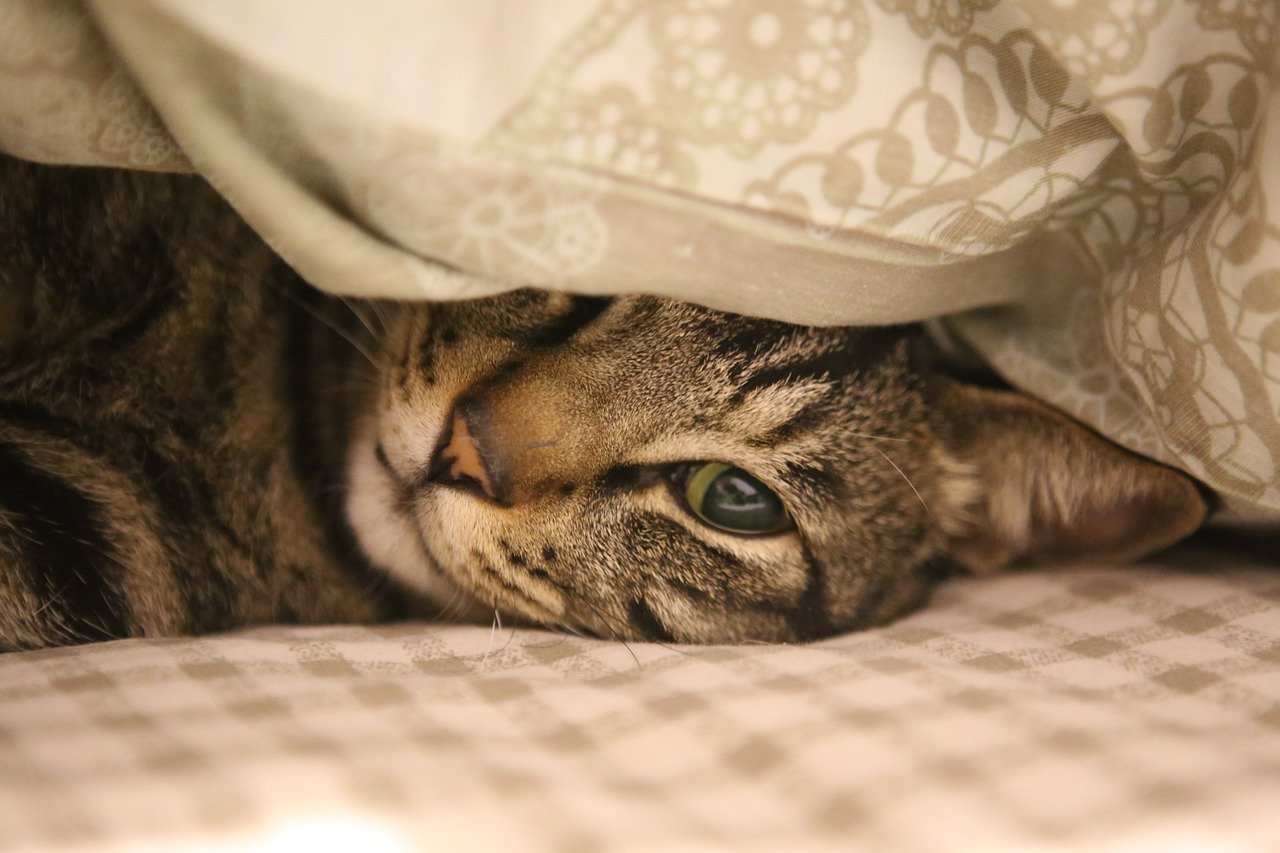
Common Nutritional Issues
When it comes to our furry friends, nutrition is a cornerstone of their overall health. However, many pet owners might not realize that their pets can face various nutritional issues that can significantly impact their well-being. Understanding these issues is crucial for ensuring that our pets lead happy, healthy lives. Some of the most common nutritional problems include obesity, allergies, and nutritional deficiencies. Each of these conditions can arise from a variety of factors, including poor dietary choices, lack of proper education on pet nutrition, and even underlying health issues.
Obesity is perhaps the most prevalent nutritional concern among pets today. Just like in humans, obesity in pets can lead to a host of health problems, including diabetes, heart disease, and joint issues. A pet that is overweight may not only have a decreased quality of life but may also face a shorter lifespan. To combat this, it's essential for pet owners to monitor their pets' weight regularly and consult with their veterinarian to establish a healthy diet and exercise plan.
Another common issue is food allergies, which can manifest in a variety of ways. Symptoms may include itching, skin irritations, gastrointestinal disturbances, and even behavioral changes. Understanding the specific allergens affecting your pet is crucial, and this often requires a process of elimination and consultation with your vet. In many cases, a specialized diet can help alleviate these issues and restore your pet's comfort.
Nutritional deficiencies can also pose a serious threat to your pet's health. These deficiencies often arise when a pet's diet lacks essential vitamins and minerals. For instance, a diet that is too low in protein can lead to muscle wasting and a weakened immune system. Similarly, a lack of essential fatty acids can result in dry skin and a dull coat. Regular vet visits can help identify these deficiencies through blood tests and dietary assessments, allowing for timely interventions.
To further illustrate these common nutritional issues, consider the following table:
| Nutritional Issue | Symptoms | Potential Consequences |
|---|---|---|
| Obesity | Excess weight, lethargy, difficulty breathing | Diabetes, heart disease, joint issues |
| Allergies | Itching, skin irritations, gastrointestinal issues | Chronic discomfort, infections |
| Nutritional Deficiencies | Weakness, poor coat quality, lethargy | Weakened immune system, organ failure |
Recognizing the signs of these issues early on is crucial for effective intervention. Pet owners should be vigilant and aware of any changes in their pet's behavior, appetite, or physical condition. If you notice any unusual symptoms, it's always best to consult with your veterinarian. They can provide tailored advice and dietary recommendations to help your pet overcome these common nutritional hurdles.
Q: How can I tell if my pet is overweight?
A: A simple way to assess your pet's weight is by checking their body condition score (BCS). You should be able to feel their ribs without excess fat covering and see a noticeable waist when viewed from above.
Q: What should I do if I suspect my pet has a food allergy?
A: Consult your veterinarian. They may recommend an elimination diet to determine the specific allergen affecting your pet.
Q: How often should I take my pet for a vet check-up?
A: Regular check-ups are essential. Generally, pets should see a vet at least once a year, but older pets or those with health issues may require more frequent visits.
Recognizing Symptoms
As a pet owner, it's crucial to be vigilant about your furry friend's health, especially when it comes to their nutrition. Recognizing the signs that something might be off can make all the difference in ensuring they receive the right dietary adjustments in a timely manner. Just like humans, pets can exhibit a range of symptoms indicating nutritional issues, and being able to identify these can lead to better health outcomes.
One of the most common symptoms to watch for is weight changes. If your pet is suddenly gaining or losing weight without any changes to their diet or activity level, it could be a sign of an underlying nutritional problem. For instance, obesity can lead to serious health complications, while sudden weight loss might indicate malnutrition or an illness. Regular weigh-ins during vet visits can help you keep track of your pet's weight and catch any concerning trends early.
Another red flag is changes in energy levels. If your usually playful dog suddenly becomes lethargic or your cat seems less interested in their favorite activities, it may be time to reevaluate their diet. Pets that lack essential nutrients may not have the energy to engage in their normal behaviors, which can be a clear indication that their nutritional needs aren't being met.
Additionally, keep an eye out for gastrointestinal issues such as vomiting, diarrhea, or constipation. These symptoms can often be linked to dietary problems. For example, a sudden change in diet or an intolerance to certain ingredients could lead to digestive distress. If you notice any of these symptoms persisting for more than a day or two, it’s best to consult your veterinarian.
Other symptoms to be aware of include:
- Skin and coat problems: Dull fur, excessive shedding, or skin irritations can indicate a lack of essential fatty acids or other nutrients.
- Behavioral changes: Increased irritability or anxiety can sometimes be linked to nutritional deficiencies.
- Dental issues: Bad breath or gum disease can be a sign of inadequate nutrition, particularly if your pet's diet lacks proper dental care components.
Ultimately, being observant and proactive about your pet's health can help you catch potential nutritional issues early. Regular vet visits provide an excellent opportunity to discuss any changes you've noticed, allowing your veterinarian to assess your pet's diet and make necessary recommendations. Remember, your pet relies on you to advocate for their health, and recognizing these symptoms is a vital part of that responsibility.
Q: How often should I take my pet to the vet for nutritional advice?
A: It's generally recommended to have a veterinary check-up at least once a year, but pets with specific health issues may need more frequent visits.
Q: What are some signs my pet might be allergic to their food?
A: Symptoms can include itching, excessive scratching, gastrointestinal upset, and changes in coat condition. Consult your vet if you suspect a food allergy.
Q: Can I change my pet’s diet on my own?
A: While it might be tempting to switch up your pet's diet, it's best to consult with your veterinarian first to ensure the new diet meets their nutritional needs.
Dietary Recommendations
When it comes to ensuring your pet's health and happiness, from your veterinarian are invaluable. Each pet is unique, and their dietary needs can vary significantly based on factors like age, breed, activity level, and any underlying health conditions. This is where your vet steps in as a crucial resource. They can guide you in choosing the right food that not only meets your pet’s nutritional requirements but also aligns with their lifestyle.
For instance, a young, active puppy will have different nutritional needs compared to a senior dog who prefers a more sedentary lifestyle. Vets often recommend high-quality commercial pet foods that are formulated to provide balanced nutrition, but they can also suggest homemade diets or specialty foods for pets with specific health issues. Here are some common dietary recommendations that veterinarians might discuss with you:
- High-Quality Protein: Look for foods that list a high-quality protein source as the first ingredient. This is essential for muscle development and overall health.
- Healthy Fats: Essential fatty acids, such as Omega-3 and Omega-6, support skin health and coat condition.
- Fiber: A good amount of fiber can aid digestion and help maintain a healthy weight.
- Vitamins and Minerals: Ensure that your pet’s diet is fortified with necessary vitamins and minerals to support their immune system and overall well-being.
Additionally, your veterinarian may recommend specific dietary supplements based on your pet's individual needs. For example, if your dog is prone to joint issues, they might suggest glucosamine supplements to help maintain joint health. On the other hand, if your cat has sensitive stomach issues, probiotics could be beneficial for improving gut health.
Another critical aspect of dietary recommendations is portion control. Overfeeding is a common mistake that can lead to obesity, which is a significant health concern for pets. Your vet can help you determine the correct portion sizes based on your pet’s weight and activity level. They may also suggest a feeding schedule to help regulate your pet’s eating habits, which can further prevent obesity and promote a healthy lifestyle.
In conclusion, regular consultations with your vet regarding dietary recommendations can significantly enhance your pet's life quality. By understanding their specific needs and following professional advice, you can ensure that your furry friend receives a diet that supports their health, vitality, and longevity. Remember, a well-fed pet is a happy pet!
- How often should I consult my vet about my pet's diet? It's advisable to discuss your pet's diet during regular check-ups, at least once a year, or whenever you notice changes in their health or behavior.
- Can I feed my pet homemade food? Yes, but it's essential to consult your vet to ensure that the homemade diet meets all of your pet's nutritional needs.
- What signs indicate that my pet's diet needs to be changed? Look for signs such as weight gain or loss, changes in coat quality, or digestive issues like vomiting or diarrhea.
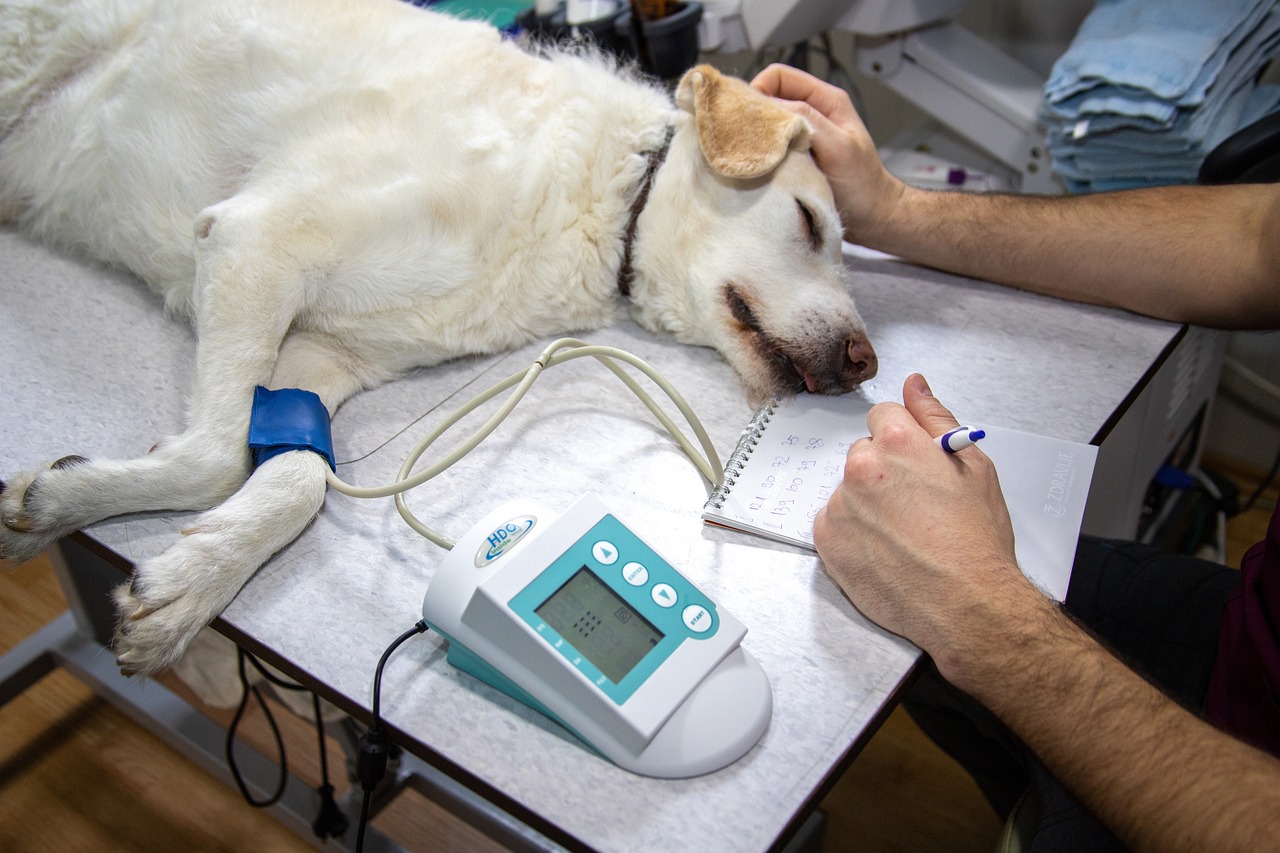
Building a Relationship with Your Vet
Establishing a strong and trusting relationship with your veterinarian is not just a good idea; it's essential for the well-being of your furry friend. Your vet is not just a medical professional; they are your partner in ensuring your pet's health and happiness. Imagine having a trusted advisor who understands your pet's unique quirks, habits, and health history—this is what a solid vet relationship can offer. It's like having a personal trainer for your pet's health, someone who not only knows the ropes but also tailors their advice specifically to your companion's needs.
Communication is key in this relationship. When you visit the vet, be open about your pet's diet, behavior, and any changes you've noticed. This exchange of information allows your veterinarian to provide the best possible care. Think of it as a two-way street; the more information you share, the better equipped your vet will be to make informed recommendations. Don't hesitate to ask questions about your pet's nutrition, health concerns, or any specific dietary needs they may have. After all, you are your pet's voice!
Trust is another crucial element. You need to feel confident that your veterinarian has your pet's best interests at heart. This trust builds over time through consistent, positive experiences. If you're unsure about a recommendation, it's perfectly okay to seek a second opinion or ask for clarification. Your veterinarian should welcome your inquiries and provide clear explanations. A good vet will help you understand the rationale behind their recommendations and work with you to create a plan that fits your pet's lifestyle.
Additionally, regular check-ups are a fantastic opportunity to strengthen this relationship. Make it a habit to schedule visits for preventive care, not just when your pet is sick. These routine appointments allow your vet to monitor your pet's health and adjust their nutritional plan as needed. Over time, your vet will become familiar with your pet's health history, making it easier to spot any changes or potential issues. This proactive approach is akin to having a financial advisor who regularly reviews your portfolio—it's about keeping everything in check before problems arise.
Furthermore, consider engaging with your veterinarian outside of appointments. Many vets offer educational resources, workshops, or community events that can deepen your understanding of pet care. Participating in these activities not only enhances your knowledge but also fosters a sense of community among pet owners. You might even meet other pet parents who share your concerns and experiences, creating a support network that benefits everyone.
In conclusion, building a relationship with your vet is a journey that requires effort, communication, and trust. By being an active participant in your pet's health care, you can ensure they receive the best possible nutrition and medical attention. After all, a happy pet leads to a happy owner, and that’s a win-win situation!
- How often should I take my pet to the vet? It's generally recommended to schedule annual check-ups for healthy pets, while older or ill pets may need more frequent visits.
- What should I discuss with my vet during visits? Talk about your pet's diet, any behavioral changes, and any health concerns you may have noticed.
- How can I establish trust with my veterinarian? Be open and honest about your pet's history and ask questions to understand their recommendations better.
- Are there any community resources for pet owners? Many veterinarians offer workshops or informational sessions that can be beneficial for pet owners.
Frequently Asked Questions
- Why are regular vet visits important for my pet's nutrition?
Regular vet visits are crucial because they allow veterinarians to assess your pet's unique nutritional needs based on factors like age, breed, and health status. These check-ups ensure your pet is getting a balanced diet tailored specifically for them, which is vital for their overall health and well-being.
- What are the signs that my pet may have a nutritional issue?
Keep an eye out for symptoms such as sudden weight gain or loss, changes in appetite, lethargy, or digestive issues like diarrhea or vomiting. If you notice any of these signs, it’s essential to consult your vet, as they can provide guidance on dietary adjustments and necessary interventions.
- How can a vet help in creating a customized diet plan for my pet?
Veterinarians can evaluate your pet's health and lifestyle to create a personalized diet plan. This process involves considering your pet's specific needs, including any health conditions, activity levels, and preferences, ensuring they receive the right balance of nutrients for optimal health.
- What nutritional deficiencies should I be aware of?
Common nutritional deficiencies in pets include a lack of essential fatty acids, vitamins, and minerals. These deficiencies can lead to various health issues like skin problems, weakened immune systems, and poor coat condition. Regular vet visits help identify and address these concerns early on.
- How often should I take my pet to the vet for nutritional guidance?
It's advisable to take your pet for a vet check-up at least once a year, but more frequent visits may be necessary for older pets or those with specific health issues. Regular consultations ensure that their diet remains appropriate as they age or as their health status changes.
- Can my vet recommend dietary supplements for my pet?
Absolutely! Vets can suggest specific dietary supplements that may benefit your pet, especially if they have particular health concerns or dietary restrictions. These supplements can help fill nutritional gaps and support your pet's overall health.
- How can I build a better relationship with my veterinarian?
Communication is key! Be open about your pet's habits, preferences, and any concerns you have. Establishing trust and a good rapport with your vet makes it easier for them to provide tailored advice and support for your pet’s nutritional needs.

